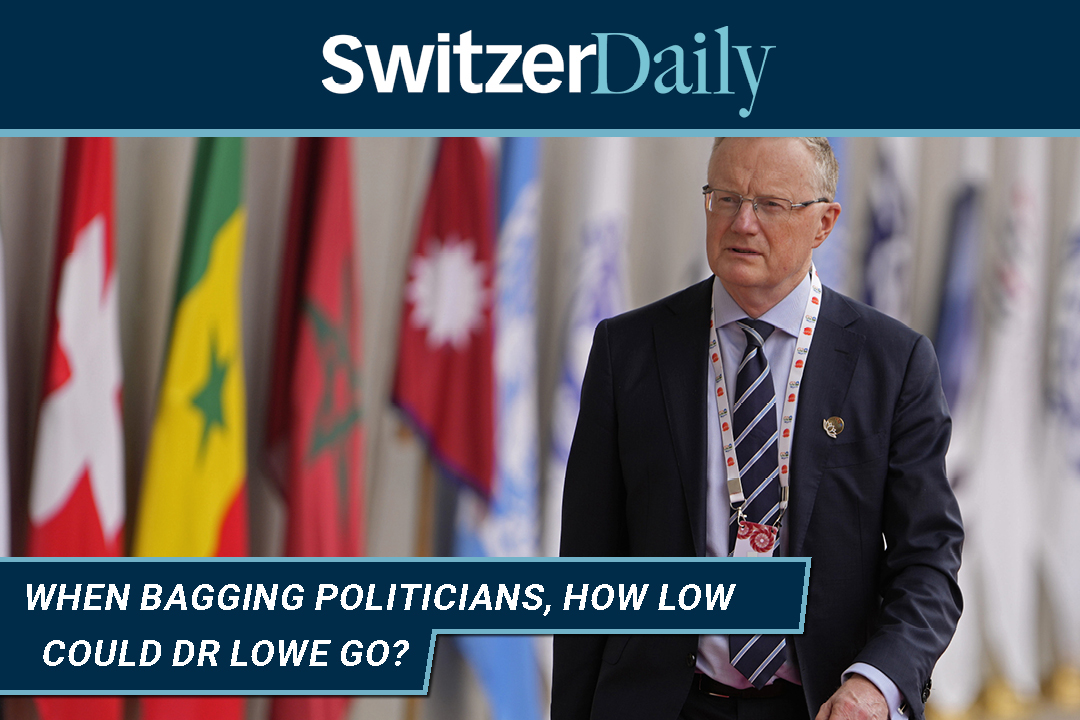

Both the The Australian and the AFR have seized upon finger pointing comments from outgoing RBA Governor, Dr Phil Lowe, about the spineless efforts of politicians to embrace reforms that will boost productivity. The word ‘spineless’ is my word but that’s the implication of this nice guy criticism of current and previous local politicians. In fact, Dr Phil did direct his blame game at the global lot who win elections worldwide.
When my colleagues on Ben Fordham’s 2GB breakfast show asked me to comment on the Lowe spray at the Labor politicians who just took away his job, I couldn’t help thinking: “How low could Dr Phil go?”
Be clear on this: I think Dr Lowe is a very well-qualified man, who has made two mistakes. The first is he should have backed away from his ‘rates on hold until 2024’ message that the media pedalled back in early 2021, as the pandemic forced lockdowns and recession upon us and the world economy.
We all needed borrowers, confident consumers and non-negative business owners/managers, who would invest ASAP to pump up the economy and employ Aussies. You might recall how desperate we all were back then. These were desperate times for everyone – from the PM to the Treasurer to our State Premiers and Treasurers to the CEOs of our public and private companies to anyone who had a business or debt.
When times are desperate, we often do desperate things, such as JobKeeper, help for businesses such as Qantas and Virgin, insolvency laws were softened, the ATO became a considerate tax body, and some premiers closed their borders! In fact, the world saw us as Fortress Australia and not too many of us complained.
Desperate times call for desperate actions, but I doubted he was right when he predicted no expected change in interest rates until 2024. I said so on 2GB and in the daily stories I write. Why? Because I have a history of over three decades of economic commentary, so I thought his call was desperately appropriate in the scary times of 2020, as long as he backed off on his call ASAP.
When the economy started to rebound in 2021, he should have done an “oops, it looks like we won’t need rates low until 2024”.
That would’ve been the right and proper thing to do, and Dr Phil’s board should have made him do it. Economics and the policies created by public servants like Dr Phil are a gamble because you’re dealing with something really complicated — people! That’s why economists, politicians, judges, public servants and business leaders often make mistakes.
Elon Musk buying Twitter is a case in point, with the BBC reporting that “Twitter has lost almost half of its advertising revenue since it was bought by Elon Musk for $44bn (£33.6bn) last October, its owner has revealed.”
That’s a big mistake but Musk can carry it, as his Tesla creation decision netted him a wealth of $250 billion!
Dr Phil’s second mistake was 12 interest rate rises in 14 meetings in little over a year. By year’s end, as the mortgage cliff hurts borrowers and consumers, we should see that 12 rises were excessive. That said, I’m an economist and I could be wrong. Dr Phil might be seen as ‘on the money’ with his rate rises.
That’s the background of Dr Phil’s comments in a speech to finance ministers and central bankers in India on Monday. In a nutshell, this is what he said:
By the way, according to The Australian’s Tom Dusevic Treasury Secretary Steve Kennedy said this after the Budget in May: “The nation’s abysmal productivity performance would wipe out more than half the expected economic bounty from full employment, record migration and the commodity export boom.”
Productivity increases what we make (goods and services), and this gives us more income, but it also lowers costs, helping us beat down inflation and boosts the real purchasing power of our income.
It’s the magic pudding but politicians would have to risk their jobs to make it happen big time. Former PM Malcolm Turnbull was a case in point. Before he became leader of the Coalition and then the country, he talked about tax reform, which had many thinking he would raise the GST, cut income taxes and overhaul a tax system that works against productivity.
However, once he put his feet under the PM’s desk in Canberra, tax reform fell into the ‘too hard basket’.
Hawke, Keating, Howard and Costello had guts and introduced reforms that helped Australia go 20 years without a recession, but not many other politicians have really stepped up.
That said, Bob Hawke did go soft on tax reform deserting Paul Keating’s big tax changes in 1985 and the then Finance Minister Peter Walsh tagged his PM as “old jellyback!”
Big reforms to boost productivity takes guts and can only be sold to voters by a leader with magnetism who can really market a great idea. I don’t think we have too many politicians of that calibre at the moment.
By the way, if Dr Lowe was a whinger, he might say this — if politicians had the guts to introduce productivity-boosting reforms, interest rates would not have had to go so high, because the productivity gains would keep a lid on inflation. And that would be a fair call.